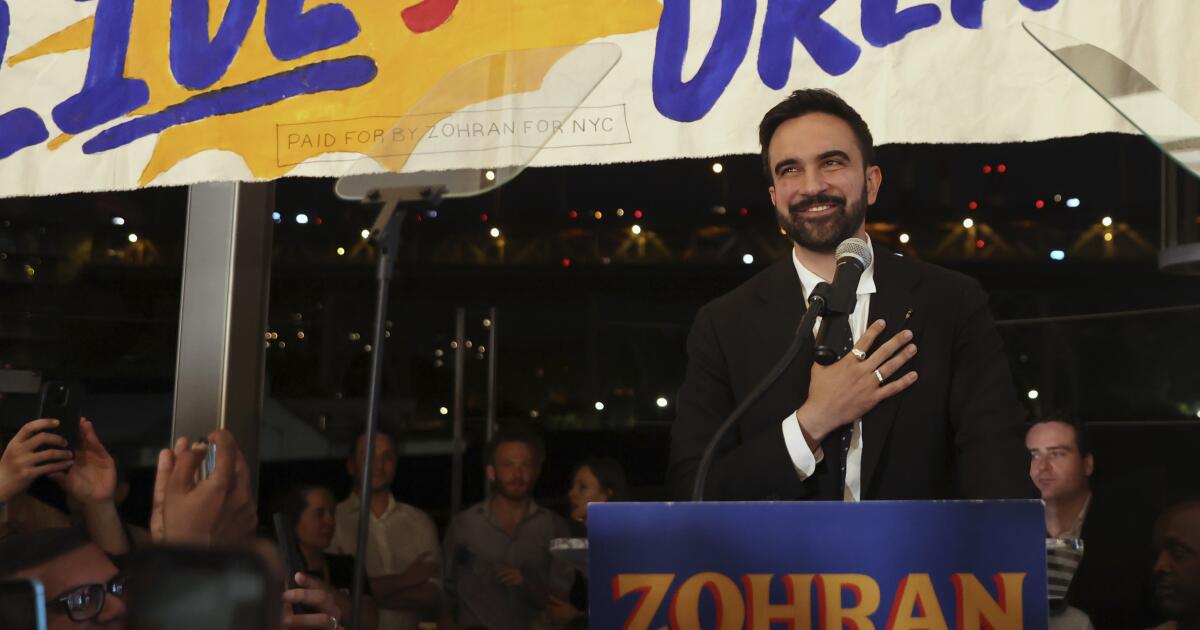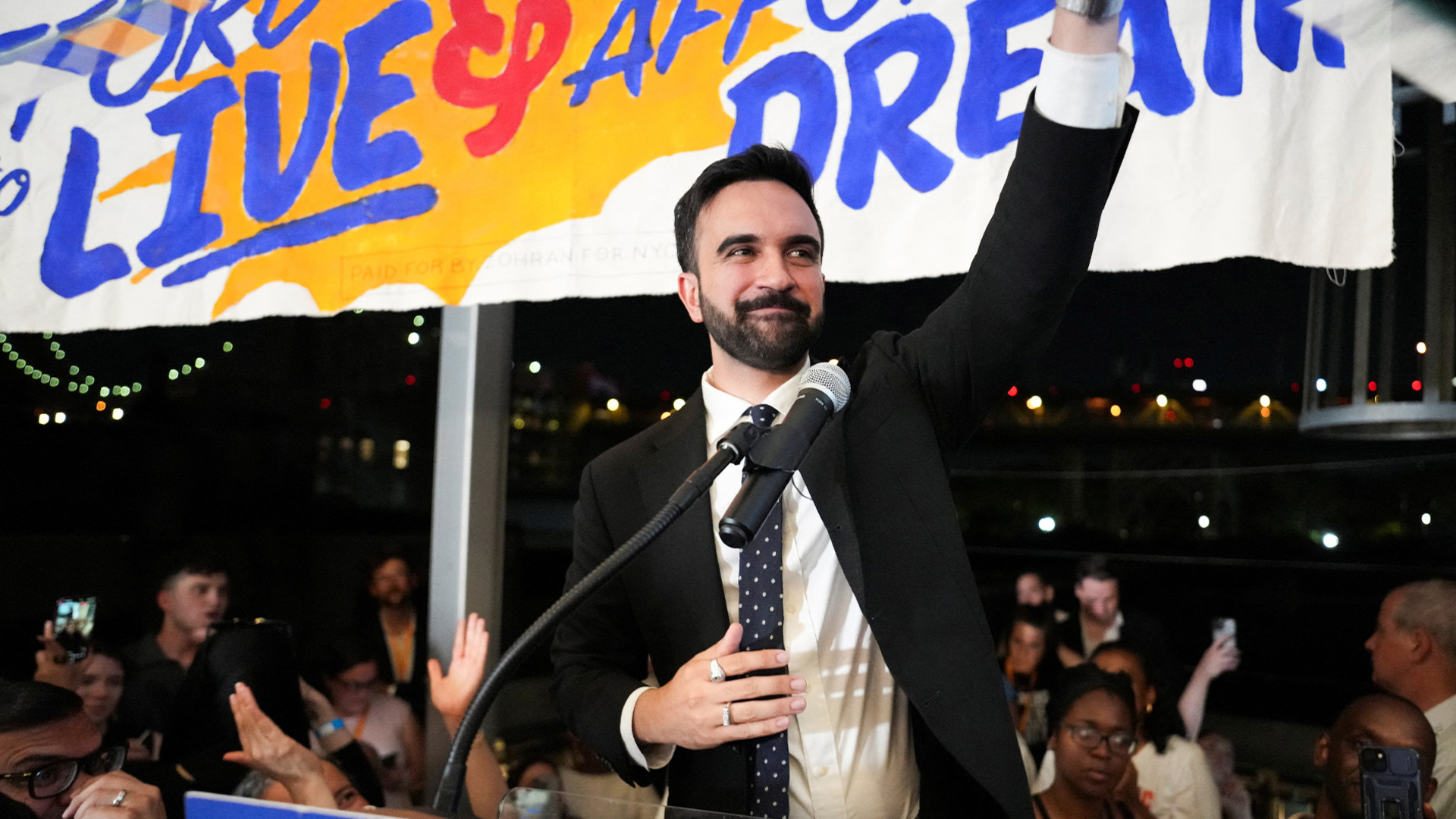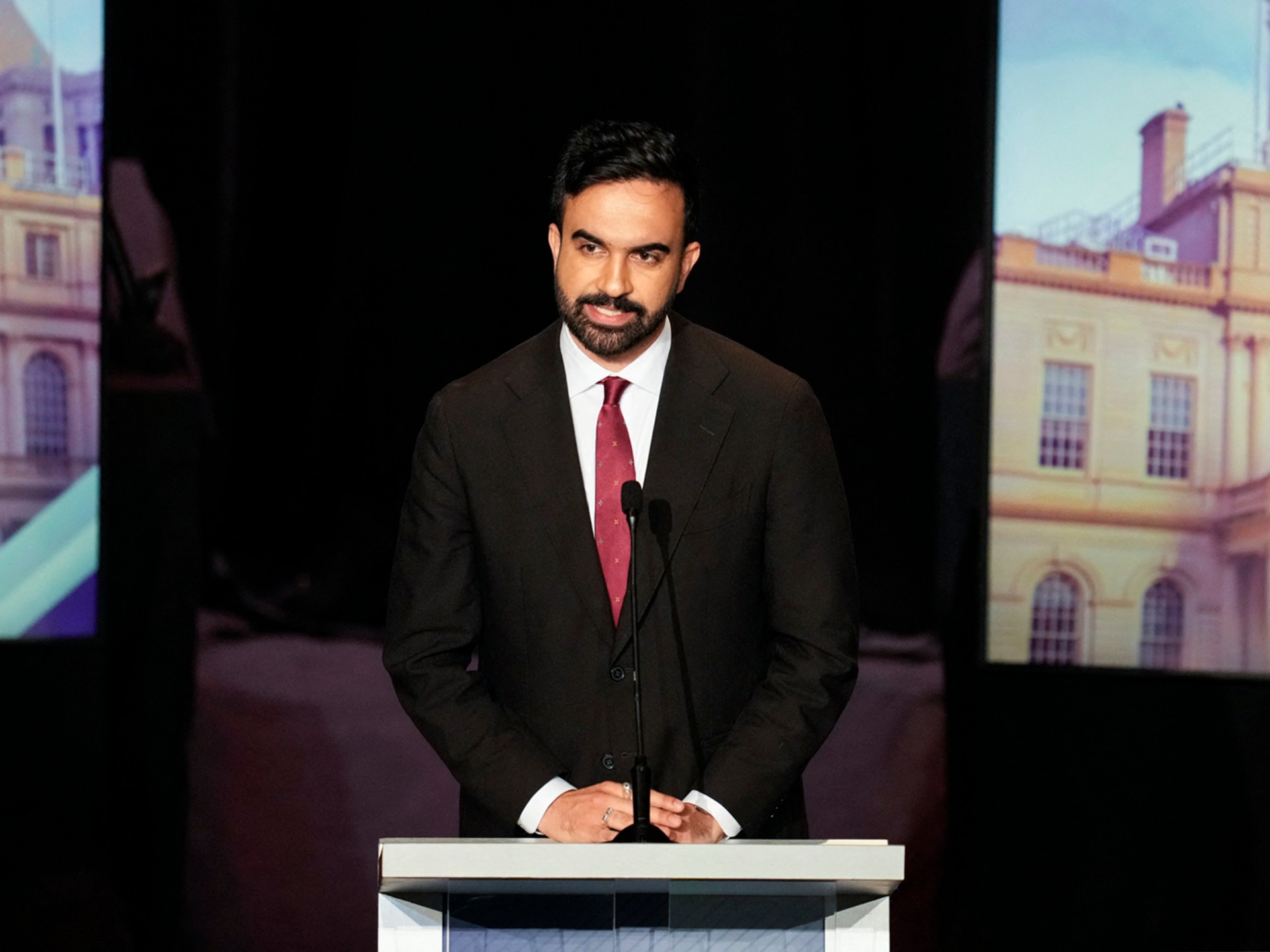Zohran Mamdani declares victory in NYC’s Democratic mayoral primary as Cuomo concedes
NEW YORK — Zohran Mamdani declared victory in New York City’s Democratic mayoral primary Tuesday night after Andrew Cuomo conceded the race in a stunning upset, as the young, progressive upstart who was virtually unknown when the contest began built a substantial lead over the more experienced but scandal-scarred former governor.
Though the race’s ultimate outcome will still be decided by a ranked choice count, Mamdani took a commanding position just hours after the polls closed.
With victory all but assured, Mamdani, a 33-year-old democratic socialist who ran an energetic campaign centered on the cost of living, told supporters, “I will be your Democratic nominee for the mayor of New York City.”
“I will be the mayor for every New Yorker, whether you voted for me, for Governor Cuomo, or felt too disillusioned by a long-broken political system to vote at all,” he said. “I will work to be a mayor you will be proud to call your own.”
Cuomo, who had been the front-runner throughout a race that was his comeback bid from a sexual harassment scandal, conceded the election, telling a crowd that he had called Mamdani to congratulate him.
“Tonight is his night. He deserved it. He won,” Cuomo told supporters.
Cuomo trailed Mamdani by a significant margin in the first choice ballots and faced an exceedingly difficult pathway to catching up when ballots are redistributed in New York City’s ranked choice voting process.
Mamdani, a member of the state Assembly since 2021, would be the city’s first Muslim and Indian American mayor if elected. Incumbent Mayor Eric Adams skipped the primary. He’s running as an independent in the general election. Cuomo also has the option of running in the general election.
“We are going to take a look and make some decisions,” Cuomo said.
Cuomo and Mamdani were a study in political contrasts and could have played stand-ins for the larger Democratic Party’s ideological divide, with one candidate a fresh-faced progressive and the other an older moderate.
Cuomo characterized the city as a threatening, out-of-control place desperate for an experienced leader who could restore order. He brought the power of a political dynasty to the race, securing an impressive array of endorsements from important local leaders and labor groups, all while political action committees created to support his campaign pulled in staggering sums of cash.
Mamdani, meanwhile, offered an optimistic message that life in the city could improve under his agenda, which was laser-focused on the idea that a mayor has the power to do things that lower the cost of living. The party’s progressive wing coalesced behind him and he secured endorsements from two of the country’s foremost progressives, Rep. Alexandria Ocasio-Cortez and Sen. Bernie Sanders.
Unofficial results from the New York City’s Board of Elections showed that Mamdani was ranked on more ballots than Cuomo. Mamdani was listed as the second choice by tens of thousands of more voters than Cuomo. And the number of votes that will factor into ranked choice voting is sure to shrink. More than 200,000 voters only listed a first choice, the Board of Elections results show, meaning that Mamdani’s performance in the first round may ultimately be enough to clear the 50% threshold.
The race’s ultimate outcome could say something about what kind of leader Democrats are looking for during President Donald Trump’s second term.
The primary winner will go on to face incumbent Adams, a Democrat who decided to run as an independent amid a public uproar over his indictment on corruption charges and the subsequent abandonment of the case by Trump’s Justice Department. Republican Curtis Sliwa, the founder of the Guardian Angels, will be on the ballot in the fall’s general election.
The rest of the pack has struggled to gain recognition in a race where nearly every candidate has cast themselves as the person best positioned to challenge Trump’s agenda.
Comptroller Brad Lander, a liberal city government stalwart, made a splash last week when he was arrested after linking arms with a man federal agents were trying to detain at an immigration court in Manhattan. In the final weeks of the race, Lander and Mamdani cross endorsed one another in an attempt to boost their collective support and damage Cuomo’s bid under the ranked choice voting system.
Among the other candidates are City Council Speaker Adrienne Adams, state Sen. Zellnor Myrie, hedge fund executive Whitney Tilson and former city Comptroller Scott Stringer.
Mamdani’s grassroots run has been hard not to notice.
His army of young canvassers relentlessly knocked on doors throughout the city seeking support. Posters of his grinning mug were up on shop windows. You couldn’t get on social media without seeing one of his well-produced videos pitching his vision — free buses, free child care, new apartments, a higher minimum wage and more, paid for by new taxes on rich people.
That youthful energy was apparent Tuesday evening, as both cautiously optimistic canvassers and ecstatic supporters lined the streets of Central Brooklyn on a sizzling hot summer day, creating a party-like atmosphere that spread from poll sites into the surrounding neighborhoods.
Outside his family’s Caribbean apothecary, Amani Kojo, a 23-year-old first-time voter, passed out iced tea to Mamdani canvassers, encouraging them to stay hydrated.
“It’s 100 degrees outside and it’s a vibe. New York City feels alive again,” Kojo said, raising a pile of Mamdani pamphlets. “It feels very electric seeing all the people around, the flyers, all the posts on my Instagram all day.”
Cuomo and some other Democrats have cast Mamdani as unqualified. They say he doesn’t have the management chops to wrangle the city’s sprawling bureaucracy or handle crises. Critics have also taken aim at Mamdani’s support for Palestinian human rights.
In response, Mamdani has slammed Cuomo over his sexual harassment scandal and his handling of the COVID-19 pandemic.
Cuomo resigned in 2021 after a report commissioned by the state attorney general concluded that he had sexually harassed at least 11 women. He has always maintained that he didn’t intentionally harass the women, saying he had simply fallen behind what was considered appropriate workplace conduct.
Izaguirre writes for the Associated Press. AP writer Jake Offenhartz contributed to this report.


